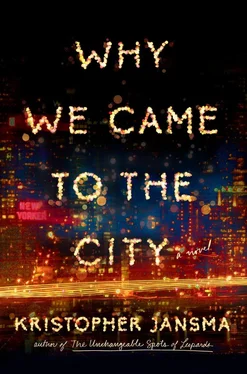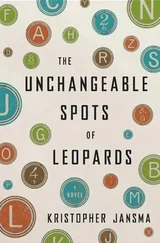Jacob went back to his work. By alternating his leaky pens every five minutes, and mopping up the ink spills in between with the backs of the business cards, he made it through the rest of the section just before the wheels touched down in Tampa.
SEPTEMBER
He hardly recognized his parents. It was like Close Encounters down there in Tampa, as if aliens had abducted the weary, grumpy people who had raised him, leaving behind these revitalized, reprogrammed retirees. His father and mother had once sleepwalked through the first half of the day. Now they woke up every morning at five a.m. and ran three miles together. They split a grapefruit for breakfast, and to cool down they swam laps. And they weren’t alone. The predawn world of Tampa was alive with octogenarians in DayGlo tracksuits, power walking down the little fake streets. Their retirement community was twenty acres lost in time, polished Cadillacs and Oldsmobiles parked in every driveway. Men wearing hats. Women stopping to chat on the corner. In the afternoons his father had tennis lessons with a coach who had formerly trained Tennessee teens for the pro circuit. “He’s got trophies in a case in his living room,” Jacob’s mother exclaimed when he joined her for a cucumber peel in the spa. “He thinks he’s Mr. Big Shot.”
His mother had befriended a woman named Lydia in the condo next to theirs, who had been a chef in Chicago for many years and was now showing his mother how to make cheese soufflés and teaching her about wine. “We’re taking a trip out to the Loire Valley next year. Have you ever been to a real vineyard before?” Jacob found himself saying he hadn’t, already mourning a whole childhood of nonexistent soufflés.
Weirdest yet was how they’d both become more Jewish. They’d stopped going to synagogue when he was a kid, thanks to Gene Blaumann’s compulsion to debate the rabbi every Shabbat before they’d even consecrated the challah. When you were too argumentative for Westchester Jews, you were in pathological territory. But now Gene Blaumann was going to Saturday-morning services? His mother was involved in an outreach program, focused on what she called the “next generation crisis.” The problem was no longer that good Jewish boys (like Gene Blaumann) married shiksa women but that even children of two natural-born Jews were less often devout, to the extent that fewer and fewer were bar or bat mitzvahed.
“Better not let them meet your gay son then,” Jacob said.
But his mother shook her head. “Oh, who cares? They all watch Will and Grace now. Nobody cares you’re gay. Just do me a favor and tell them you go to services for Shabbat.”
Fortunately between the exercising, the culinary lessons, the services, and the card games, his parents were almost too busy to notice he was there. He indexed The Odyssey by the pool most of the day before they dragged him out to Amici’s, the local Italian place that “everybody” went to, for dinner. Nobody was interested in his complaint that it seemed ludicrous to use an English possessive with a plural Italian noun.
“We got you an iPhone,” his father said as antipasto came. “Give it to him, Anjelica.”
His mother dropped her knife on the fried artichoke. “Let him open it and find out!”
“What’s the surprise?” his dad said. “That’s what everybody gets now. Coach told me the 3GS is really good. I got one for me too.”
And before Jacob’s very eyes, his own father produced an iPhone from his pocket.
“You can put all your songs on here. Books too! Don’t have to lug that huge thing around with you all the time. You’re going to mess up your back. Take it from me.”
Jacob clutched the book on the bench beside him as if it were a life vest and Amici’s Family Restaurant were about to get hit with a tidal wave. “Thanks so much,” he said, taking the gift without unwrapping it.
“And you can get Facebook on it too,” his mother said. “Are you on Facebook?”
“No, I am not on Facebook. Tell me you aren’t.”
“Oh, you have to see. Gene, show him how you put all your people in it.”
And Jacob watched as his father held the phone up over the bowl of calamari and scrolled, slowly, through a list of contacts with his thumb. Jacob watched as his mother craned her neck to see who was coming into the restaurant and if it was anyone she needed to wave at. Maybe they were still his parents after all.
“So are you meeting any nice men up there?” she asked.
Not that Jacob was going to answer, but for fear that he might, his father quickly changed the subject. “Why don’t you quit that stupid job and call Phil Jalasko’s son at Sony Records? Poetry’s kind of like music, and I bet you they could use someone smart like you to fix up some of those lyrics. ‘You and me could write a bad romance’—is that English?”
“Please tell me you don’t have Lady Gaga on that thing.”
His father sighed and mashed some buttons. “Phil’s son put some stuff on there. I don’t — I can’t tell how to take things off.”
“Here,” Jacob said, “let me show you.” The next morning they drove him back to the airport and dropped him off at the curb, his father waving his phone in the air, smiling, and his mother crying as she did every time they did this.
“When you get there, if you don’t mind, just let us know you made it, all right?” she asked as she hugged him by the curb.
Begrudgingly, Jacob had to admit that it was somewhat pleasant to listen to West Side Story and Fleetwood Mac’s Rumours over and over again on the flight back (the only two withstandable CDs of his mother’s that he could find). And with a fresh set of pens and a pack of Kleenex, he managed to get all the way through Book 24 before they touched down in New York. That night, after Oliver fell asleep watching another nature program, Jacob got up and finished the concluding notes in the study. He worked all night without sleeping, and during the ride to Anchorage House, he read and reread the notes. It was the hardest he’d worked on anything since Shitstorm, and he wasn’t even a little sad to be giving it away.
That morning, before the wake-up rounds began, Jacob slipped the annotated copy of The Odyssey onto the bookshelf in Ward III. By lunchtime, it was gone. As he patrolled the outer hallway, he saw Ella in the cafeteria in deep-reading mode. Maura’s chatter from the other end of the table wasn’t causing even the slightest distraction. Ella’s eyes flew between the book and the notebook. In Feingold’s group, everything about her demeanor suggested that she was no longer present, besides bodily, in this universe. And as Sissy tried to get everyone to make hand puppets out of paper bags that afternoon, Ella glued on eyes and ribbons idly, her smile stretching and collapsing like the bellows of an accordion playing inaudible notes.
At last, in the afternoon Jacob had the chance to talk with her briefly in the common room. Paul was watching, he could tell, and so were Dr. Dorothy and Dr. Wilkens, from where they were conferencing next door, but Jacob had no reason left to care. Whatever happened, this thing was hers.
Ella clutched the book as if it might run away. “You did this?”
“That?” Jacob looked carefully. “Appears to be the work of a fellow named ‘Ho-mer.’”
Ella looked at the ceiling, as if the right words might be up there. “Well. Thank you. I mean. I don’t know how to thank you.”
“You did already. Just before there… when you said ‘thank you.’”
She got a look as if contemplating many, many things that she couldn’t possibly find the time to say. At last she settled on “Okay, this time you have to explain though. Why?”
Читать дальше












